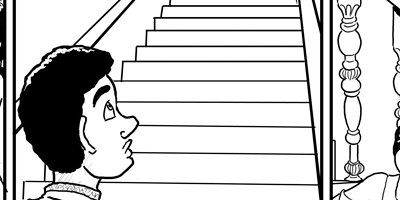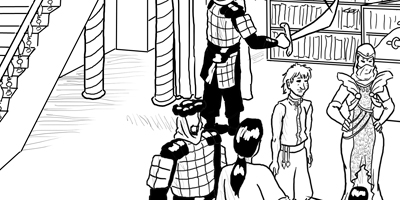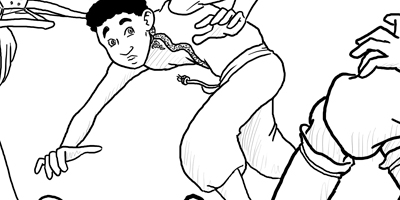Hi, everybody! Sorry it’s been a while since I posted, but I was traveling through a number of parallel universes and checking out all sorts of movies that never got made in our reality, and Internet access was spotty. I can’t say the trip was worth every penny (the universe where every single movie since 1966 was a sequel to ‘Manos: The Hands of Fate’ was a particular lowlight) but I did really enjoy seeing all of the James Bond movies in the universe where Batman and James Bond had each other’s Rogue’s Galleries. Still, as always with these things, some were better than others…and since this is the Internet, naturally I am compelled to rank them all for you!
continue reading "Ranking the James Bond/Batman Mash-Ups"
18
Dec
18
Dec
If you watch professional sports of any sort, you know that good players have a productivity curve. They come out young and limber but not really knowing what they’re doing, and then they learn their craft and how to exploit their natural talents to the fullest, and they hit their peak. And then Father Time steps in and they start aging, and they can’t run as fast or push as hard or go as long or heal as quickly, because now they’re in their thirties trying to hang with kids in their early twenties, and their skill may be even greater but their bodies betray them. This is a fact of sports.
However, great players, the ones with hall of fame careers – these are the ones who adapt. They recognize that their old style of play no longer allows them to flourish, and they work like hell to find a new game, refining the parts they can still do to a godlike level while discarding those areas where they are now substandard. Every athlete tries to do this; many fail. The great ones succeed – Michael Jordan revamped his game at least twice, for example (and some claim three times) to accomodate his diminishing physicality.
The reason I am discussing this is because writing, when you get down to it, is a lot like sports. Nobody talks about how, as writers (or most artists, really) get older, they tend to produce less great work. The good stuff in most writers’ careers comes in the middle section, and the stuff at the end is usually the province of the tolerable. The stuff fans enjoy but new readers don’t seek out.
And, to make all of this relevant to the post title, this is why Raising Steam is so wonderful. Over his last few books we’ve seen Terry Pratchett trying to be the Terry Pratchett of old, but since about Wintersmith we’ve seen the slow and deleterious effects of his early-onset Alzheimer’s creeping into the work. Still enjoyable books, for the most part, but not since Thud! has there been a Pratchett book that feels like height-of-his-powers Pterry and we all recognized that, and marked it as Mother Nature being a bitch, and sighed.
But in Raising Steam Pratchett has written a book that simply does not feel like his earlier works. It’s still identifiably a Discworld book and still identifiably Pratchett, but the entire style of the book is completely different. Where most Pratchett previously was driven by the power of his core narrative, this book is more a collection of diverse scenes. Still scenes all connected to a central narrative, of course, but the format feels far more epistolary than we are used to from him (and he has always been a writer who has enjoyed his fun little asides).
But the thing of it is: this is great writing. It is great writing unlike what we are used to from Pratchett, to be sure, but it is great writing nonetheless. Call it Pratchett 2.0 if you like, because it takes the meandering sensibility of his most recent books and puts it to use; a writer challenged by time turning his new problems into positives. It’s a deeply inspiring book on that level, and it’s not right to call it “one of his best” because it really does feel like a whole different writer while still being the same man – Terry Pratchett of Earth-2, or similar.
17
Dec
THE NEW ADVENTURES OF BLUEBERRY SLUSH DOG was always my favorite as a kid
Posted by MGK Published in The Internets, TVMy weekly TV column is up at Torontoist.
16
Dec

Click on thumb to see full
And thus concludes our brief prequel story. As always, you can also go to the dedicated Al’Rashad site. We’ll return to the main story with Davinder next week.
13
Dec
The rec.sport.pro-wrestling Awards are the oldest public-vote wrestling awards on the internet. Dating back to 1990 (when Curt Hennig won Best Wrestler, Scott Steiner’s Frankensteiner won Best Move, and Hulk Hogan versus Earthquake won Worst Feud), the RSPW Awards now span over two decades and are far and away the most comprehensive wrestling awards in wrestling fandom. They are the oldest awards and the best awards. You can see the results of the 2012 Awards (which also contain the entire history of winners in all categories) for the “best of year” awards here and the “worst of year” awards here.
This is the Call to Nominations for the 2013 RSPW Awards. The Nominations phase is not a strict rule of eventual award nominees – if nobody nominates CM Punk for Best Wrestler, for example (let’s say that an apocalypse happens and we’re all too busy for the next month, because that is the only way that will happen on the internet), come time for voting, people can still vote for CM Punk as Best Wrestler. The Nominations are intended, instead, to present voters with a list of suggested candidates to consider when assigning their votes (as voters will vote for a 1st, 2nd and 3rd place in each category).
Maybe when voting for Best Tag Team, you will forget about how great Christopher Daniels and Kazarian have been this year (or maybe you don’t watch TNA often enough to know). Maybe you weren’t aware of how much fun Wrestling is Fun! is as a promotion (despite it being in their name – maybe you are illiterate or something? If so, how are you reading this?), and seeing them nominated causes you to check them out. That’s the point of the nominations: to expose wrestling fans to the wider wrestling universe. Just like the Awards themselves, when you think about it. You can nominate candidates for awards here.
Nominees are due by December 28, 2012; we will update this post with a list of all current nominations on December 21. Awards voting proper will begin on January 1, 2013. A list of current nominees can be found here.
12
Dec
Presented without comment before someone else does it first
Posted by MGK Published in Bad Comedy, Comics, Photoshopp'd
10
Dec
Why aren’t you on Twitter, anyway? Twitter is fun.
Posted by MGK Published in Bad Comedy, The Internets9
Dec
My weekly TV column is up at Torontoist.
9
Dec

Click on thumb to see full
As always, you can also go to the dedicated Al’Rashad site.
5
Dec
I was talking with Ty Templeton earlier in the week and he explained to me that (while we were talking about gender roles in fiction) he had had real trouble coming up with a list of female protagonists who when introduced were not defined by an element of suffering or hardship. Every female romantic comedy protagonist ever, for example, is defined by their lack of a partner; that’s the entire point of romantic comedy. But this extends beyond just romcoms; female protagonists are almost always given a background of suffering or hardship which they must then overcome (as opposed to suffering or hardship within the story; that’s just dramatic conflict).
Ty explained that in previous conversations about this, he was able to identify only two female protagonists who didn’t enter the story defined by a hardship they would have to overcome as part of their narrative: Julia Child in Julie and Julia (her story is straightforward; she has a goal – to become a great cook – and she achieves it, and her past traumas suffered during the war and her inability to have a child are not relevant to her achievement) and Erin Brockovich (where Erin Brockovich may be poor/lower-class, but her narrative does not present that as something to overcome; her goal is achieve success in a class-action lawsuit and does so).
I gave it some thought afterwards and added two more: Baby in Dirty Dancing and Marge Gunderson in Fargo. But after that, I’m stuck. So what others are there? Surely there must be others!
3
Dec
Fifty Improvements of Archie
Posted by MGK Published in Archie (Improved Or Otherwise), Comics, Interactive Fun Time Party
2
Dec
My weekly TV column is up at Torontoist.
28
Nov
…looks like this: nearly seven thousand words dedicated to the principle that MENS IS MENS AND WOMENS IS WOMENS AND NE’ER THE TWAIN SHALL MEET.
Oh wait, did I say seven thousand words? Because I actually meant ten thousand – no, wait, thirteen – oh my god we’re at eighteen now and apparently it turns out that the civil rights movement in the United States was a “Republican movement” and that the NRA helped arm blacks and the Nazis were in fact leftists and so forth.
Really, it’s a stream of utter drivel from a whiny fedora-wearing jackass who hasn’t gotten over the fact that he was publicly and rightly mocked for his homophobic bullshittery and who wears his persecution complex like a badge of honour – a longwinded, bloated, eighteen-thousand-words-and-counting badge of honour, remarkable only in its immensity.
Still, if nothing else, this serves as a valuable object lesson: when you read this (well, if you can get through the entirety of it; it’s a joyless slog, all self-congratulation and abuse of no doubt multiple thesauri), you can take solace in the fact that this is a man who is, in fact, a professional writer, and who is living proof that a writing career has much more to do with work ethic than it does innate talent.
Search
"[O]ne of the funniest bloggers on the planet... I only wish he updated more."
-- Popcrunch.com
"By MightyGodKing, we mean sexiest blog in western civilization."
-- Jenn
Contact
MGKontributors
The Big Board
MGKlassics

Blogroll
- ‘Aqoul
- 4th Letter
- Andrew Wheeler
- Balloon Juice
- Basic Instructions
- Blog@Newsarama
- Cat and Girl
- Chris Butcher
- Colby File
- Comics Should Be Good!
- Creekside
- Dave’s Long Box
- Dead Things On Sticks
- Digby
- Enjoy Every Sandwich
- Ezra Klein
- Fafblog
- Galloping Beaver
- Garth Turner
- House To Astonish
- Howling Curmudgeons
- James Berardinelli
- John Seavey
- Journalista
- Kash Mansori
- Ken Levine
- Kevin Church
- Kevin Drum
- Kung Fu Monkey
- Lawyers, Guns and Money
- Leonard Pierce
- Letterboxd – Christopher Bird - Letterboxd – Christopher Bird
- Little Dee
- Mark Kleiman
- Marmaduke Explained
- My Blahg
- Nobody Scores!
- Norman Wilner
- Nunc Scio
- Obsidian Wings
- Occasional Superheroine
- Pajiba!
- Paul Wells
- Penny Arcade
- Perry Bible Fellowship
- Plastikgyrl
- POGGE
- Progressive Ruin
- sayitwithpie
- scans_daily
- Scary-Go-Round
- Scott Tribe
- Tangible.ca
- The Big Picture
- The Bloggess
- The Comics Reporter
- The Cunning Realist
- The ISB
- The Non-Adventures of Wonderella
- The Savage Critics
- The Superest
- The X-Axis
- Torontoist.com
- Very Good Taste
- We The Robots
- XKCD
- Yirmumah!
Donate
Archives
- August 2023
- May 2022
- January 2022
- May 2021
- January 2021
- December 2020
- October 2020
- June 2020
- March 2020
- January 2020
- December 2019
- October 2019
- February 2019
- January 2019
- December 2018
- April 2018
- March 2018
- February 2018
- January 2018
- December 2017
- November 2017
- October 2017
- February 2017
- January 2017
- December 2016
- November 2016
- October 2016
- September 2016
- August 2016
- July 2016
- June 2016
- May 2016
- April 2016
- March 2016
- February 2016
- January 2016
- December 2015
- November 2015
- October 2015
- September 2015
- August 2015
- July 2015
- June 2015
- May 2015
- April 2015
- March 2015
- February 2015
- January 2015
- December 2014
- November 2014
- October 2014
- September 2014
- August 2014
- July 2014
- June 2014
- May 2014
- April 2014
- March 2014
- February 2014
- January 2014
- December 2013
- November 2013
- October 2013
- September 2013
- August 2013
- July 2013
- June 2013
- May 2013
- April 2013
- March 2013
- February 2013
- January 2013
- December 2012
- November 2012
- October 2012
- September 2012
- August 2012
- July 2012
- June 2012
- May 2012
- April 2012
- March 2012
- February 2012
- January 2012
- December 2011
- November 2011
- October 2011
- September 2011
- August 2011
- July 2011
- June 2011
- May 2011
- April 2011
- March 2011
- February 2011
- January 2011
- December 2010
- November 2010
- October 2010
- September 2010
- August 2010
- July 2010
- June 2010
- May 2010
- April 2010
- March 2010
- February 2010
- January 2010
- December 2009
- November 2009
- October 2009
- September 2009
- August 2009
- July 2009
- June 2009
- May 2009
- April 2009
- March 2009
- February 2009
- January 2009
- December 2008
- November 2008
- October 2008
- September 2008
- August 2008
- July 2008
- June 2008
- May 2008
- April 2008
- March 2008
- February 2008
- January 2008
- December 2007
- November 2007
- October 2007
- September 2007
- August 2007
- July 2007
- February 2007
Tweet Machine
- No Tweets Available
Recent Posts
- Server maintenance for https
- CALL FOR VOTES: the 2021 rec.sport.pro-wrestling Awards
- CALL FOR NOMINATIONS: The 2021 rec.sport.pro-wrestling Awards (the Theszies)
- The 2020 RSPW Awards – RESULTS
- CALL FOR VOTES: the 2020 Theszies (rec.sport.pro-wrestling Awards)
- CALL FOR NOMINATIONS: The 2020 Theszies (rec.sport.pro-wrestling awards)
- given today’s news
- If you can Schumacher it there you can Schumacher it anywhere
- The 2019 RSPW Awards – RESULTS
- CALL FOR VOTES – The 2019 RSPW Awards (The Theszies)
Recent Comments
- Harley in Thursday WHO'S WHO: Tim Trench
- George Leonard in When Pogo Met Simple J. Malarkey
- Blob in How Jason Todd Went Wrong A Second Time
- Cindi Chesser in Thursday WHO'S WHO: The War Wheel
- Scott Hater in Bing, Bang, Bing, Fuck Off
- dan loz in Hey, remember how we talked a while a back about b…
- Sean in Server maintenance for https
- Ethan in CALL FOR VOTES: the 2021 rec.sport.pro-wrestling A…
- wyrmsine in ALIGNMENT CHART! Search Engines
- Jeff in CALL FOR VOTES: the 2021 rec.sport.pro-wrestling A…

